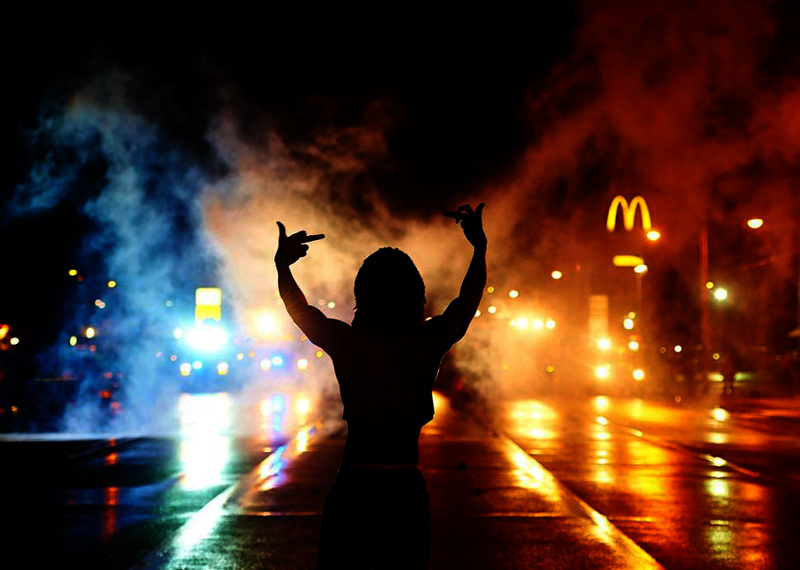
ST. PETERSBURG, FL, February 27 — A proposal for Black Community Control of the Police from the Pinellas local of the Green Party of Florida (GPFL) to amend the state platform of the Green Party of Florida failed to get the two-thirds majority necessary for passage. The proposal had stated, “The Platform of the Green Party of Florida should be revised under section ‘N. CRIMINAL JUSTICE/LAW ENFORCEMENT’ to read: ‘1. In a society where the police are a tool for the domination and colonization of the Black community, we join the call for Black community control of the police.’ ” The fight for Black Community Control of the Police is not over.
Background
Martin Luther King Day on January 15 was supposed to have been a celebration. But the St. Petersburg city government instead turned it into a nightmare.
Without warning, armed police put the mostly Black South Side on lockdown, flooding its streets for blocks in every direction, preventing friends from visiting their friends, emergency vehicles from responding to emergencies, and trying to shut down neighborhood vendors from serving their community. People returning to their homes were met by the chilling demand, “Your papers please!”
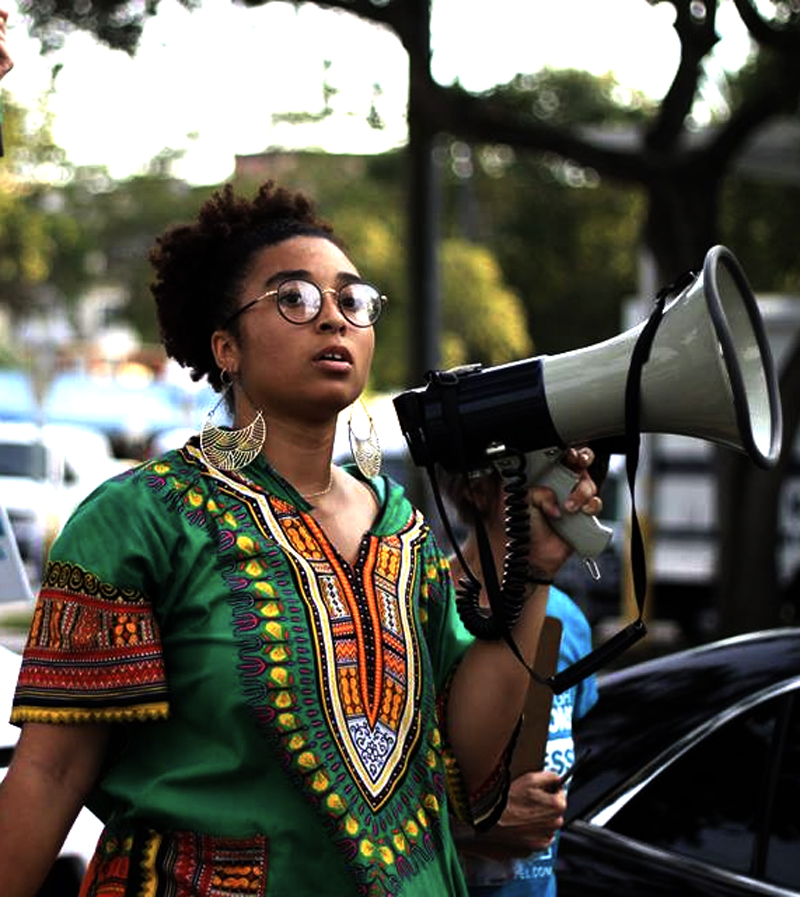
Akilé Anai
An outraged community packed the City Council chambers three days later, to vent their discontent. But their pleas fell on the deaf ears of Mayor Rick Kriseman, the Democrat they had just re-elected only two months before. The speakers mainly demanded better “training,” “sensitivity training,” and “community input.” There was only one group who spoke to the heart of the matter — Communities United for Reparations and Economic Development (CURED). Its Chair Akilé Anai, who had run for City Council District 6 the summer before, and her followers in the Uhuru movement demanded not training, not sensitivity, but straight-out Black Community control of the police.
After all, many of the police who had locked down the MLK celebration were Black themselves. I would suppose many were well-trained, and some were perhaps even warm, sensitive human beings, but Kriseman and his very Black Chief of Police Anthony Holloway hold the power.
Who ordered the lockdown?
Putting it simply, Black Community control of the police means having the power to say “No! You can’t shut us down on our most festive day, or any day! You can’t terrorize our community! You can’t murder our youth again and again and again!”
Following Akilé’s lead, the Pinellas local of the Green Party of Florida (GPFL) took a hard look at the state party’s platform under N. CRIMINAL JUSTICE/LAW ENFORCEMENT. We found it had many worthy points, but the overall approach was summed up thusly, asking for:
(4.) Policies which seek meaningful input from local communities when identifying and addressing crime in their areas.
(5.) creation and funding of civilian police review boards that have the power of subpoena.
Unfortunately, “input” and “review” are not CONTROL. The platform does not address the issue of POWER. So Maggie Gouldin, a Pinellas Coordinating Council (CC) rep, set forth the above-mentioned proposal adding to “N. CRIMINAL JUSTICE/LAW ENFORCEMENT” the words:
“(1.) In a society where the police are a tool for the domination and colonization of the Black community, we join the call for Black community control of the police.”
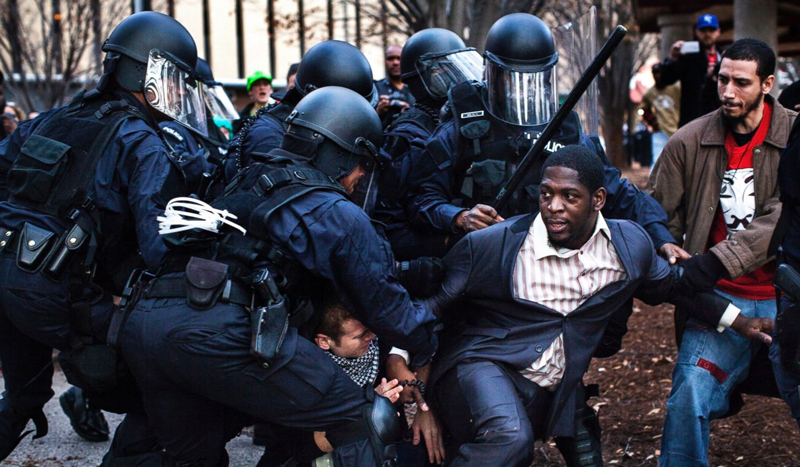 The “liberals” don’t like Black control.
The “liberals” don’t like Black control.
In discussion, the new wording was immediately opposed by LeBeau Kpadenou (a relatively new Black GPFL member) and Bonnie Redding, GPFL CC reps from Palm Beach County. Kpadenou stated, “I am concerned that if held up to scrutiny this amendment will make us (and by association, our allies in the police accountability movement) look foolish and unserious.” (“Allies,” of course, means Democrats.) He then said he would vote yes because it had “overwhelming support.”
But after Redding chimed in with, “the language of the proposal is not sufficient. It is a blanket statement that calls for much more detail and explanation. Therefore, I vote No,” Kpadenou became the proposal’s fiercest opponent. Kpadenou went on to argue that the entire community should determine policy, “This would not hand control over to black people exclusively, except in cities with overwhelming black majorities. But I don’t support rule by race anyway.” He accused Pinellas of running “an aggressive, guilt-based campaign to ram it through.”
However, powerful support for Community Control came from Robin Harris, a Black lesbian who is chair of the Central Florida (Orlando) local:
“[W]e almost had similar issues w HR 40 (Reparations for African Americans) on the national side … It took a White Supremacist to come expose himself and embarrass those who were going to vote no [to instead] vote Yes. It troubles me that confusion or hesitation takes the forefront when there is a demand in favor of Blackness.”
“… Review Boards are a joke … Policemen investigate themselves … Please … there needs to be clear concise message that we see and hear what’s going on. The misogyny and Patriarchy within that culture no longer deserve a break. I support it.”
Harris is running for Orange County Commission District 6.
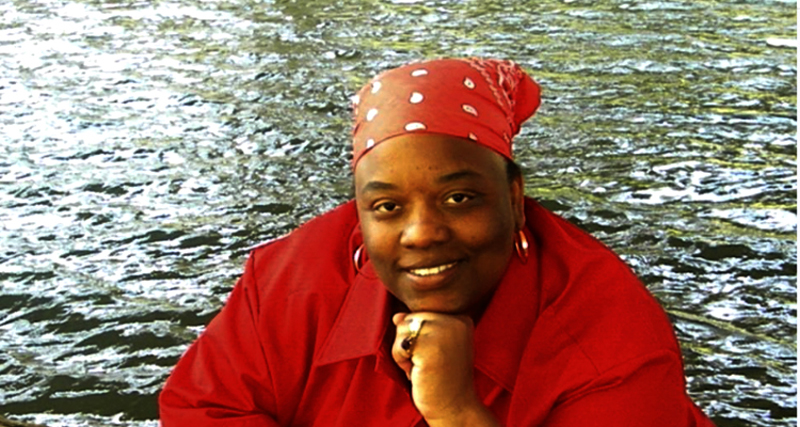
Robin Harris.
Gouldin from Pinellas added:
“Communities” would be ALL the communities of the city. And when it says the ‘community could make it happen,’ that likewise means the ENTIRE city. So if the white majority in St. Pete wanted the South Side to be locked down on MLK Day, that would be okay?
“I know this offends LeBeau mightily, but the example of Black Lives Matter and ALL Lives Matter is quite relevant. In the guise of appealing to some universal humanity, reactionary forces use it to attack the real movement for Black liberation. It’s not just the logic, it’s the historical fact.
“The Pinellas proposal asserts the principle that the Black community must CONTROL how it is policed. Period. How that is done cannot, and should not, be wrapped in a ‘one size fits all’ approach that LeBeau is attempting while obscuring the need for Black power. LeBeau states, ‘I don’t support rule by race anyway.’ But rule by race is what we now have in a white majority country and state.”
Finally, GPFL Co-Chair Jennifer Sullivan from Hernando County stepped in, accusing the proposal’s supporters of being the “far left” who would turn off liberals. She had initially offered her support, but Kpadenou’s opposition made it possible for her to now oppose the proposal without appearing racist, or so she hoped. In one of her most coherent arguments, she wrote:
“Hernando would vote yes, but we do not want to leave any communities of color out. Latino and Middle Eastern (read Muslims, Sikh, Buddhists) people may not be hunted down at the current rate that blacks have been, but why wait until they are next? What about women and other genders? Why not insist on direct proportional representation in all communities having control of their police?”
Giving “reductio ad absurdum” new meaning, Hernando voted no. And Sullivan added:
“We can’t just appear to come out as if we mostly support one race, at the expense of others – even if we feel they deserve it. It’s not the way to go for any race, religion or culture to dominate others and it is not Green. I do not want the white race to control the police and, therefore, I won’t just go to the opposite either.”
Sullivan then offered Police Review Boards responsible to particular communities:
“We, therefore, call for the community to be empowered with the ability to review all applicants wishing to serve in their community and to have the final word and authority to hire, fire and discipline officers to ensure the best interests of all in the said community.” [emphasis added]
Coherent but wrong. It is a perfect articulation of the “All Lives Matter” argument that the police associations have used in order to attack “Black Lives Matter.” Again, the issue is not hiring, firing and disciplining officers. It is Control.
For a United Front Against Gentrification.
A war has begun against the Black community in St. Pete, as it is raging in communities across the country. The weapon is Gentrification. The lockdown on MLK day marked a serious escalation of police repression against the South Side. The Black community had been dealt a devastating blow when the entire Gas Plant District south of Central Avenue was leveled in 1986, to make way for a baseball stadium (the “Dome”) for the Tampa Bay Rays, displacing a thousand Black residents and Black-owned businesses. Now, with the Rays having decided to leave St. Pete and its acknowledgedly decrepit stadium, the land has become the mecca for a horde of developers, hoping to push their way deeper into the

The Master Plan.
“The MLK Day lockdown marked the developers laying claim to everything to the south of Central Avenue,” explained Rose Roby, co-chair of the Pinellas local. “The city has alreadyu escalated its war against the homeless in the past year, in order to raise property values for the tourist industry that has been a major supporter of Mayor Kriseman. It has gone so far as to rename that section of the South Side below Central Avenue as ‘Midtown,’ making clear who now owns it. The small shops and restaurants that give downtown St. Pete its community flavor are slated for massive rent increases. They are to be replaced by the upscale tourists who give nothing back to the city. Highrises are going up and facing community opposition, while trailer parks occupied by the elderly poor are marked for demolition.
“In response, the Pinellas local of the GPFL has decided to take on the fight against gentrification in all its forms. Communities United for Reparations and Economic Development (CURED) has called for taking back the Dome in order to build affordable housing for the Black community, and demands a moratorium on high-rise development, which resulted in the incredible sewage crisis that ended up dumping a billion gallons of raw sewage into the Bay and onto the streets of the South Side.
“The Green Party supports those demands.”
Roby is also a member of the CURED Executive Committee.
Robin Harris for Orange County Commission Dist. 6
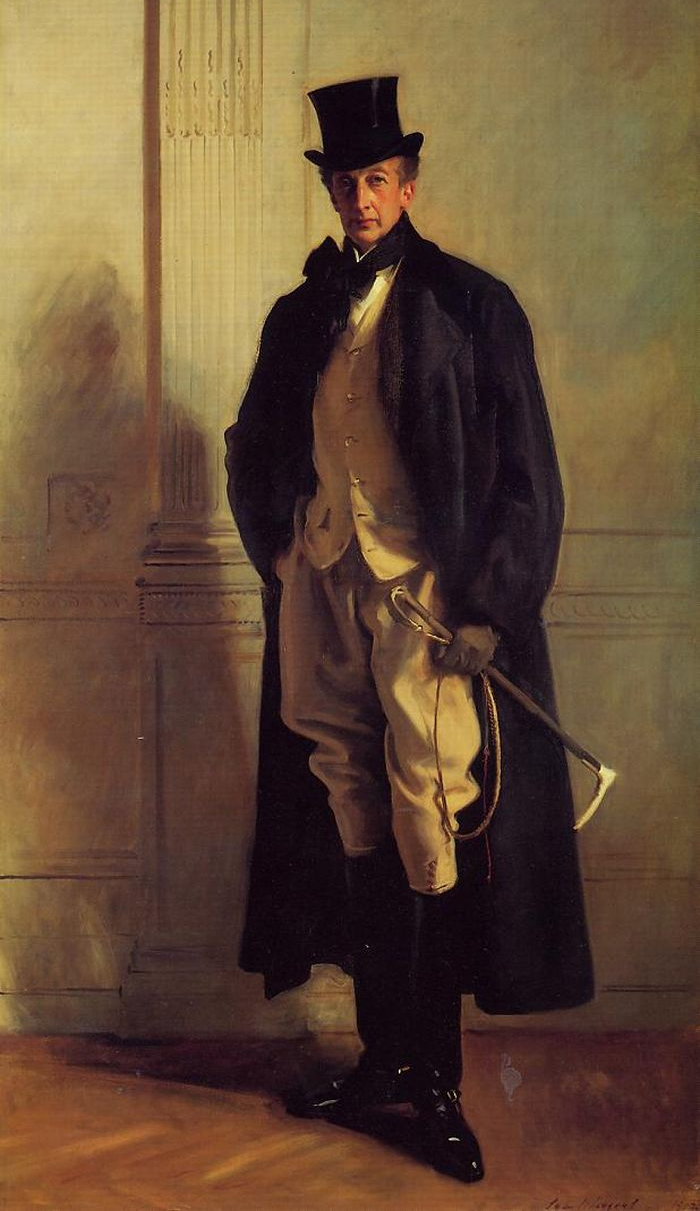
The New “Master.”
Expanding that front, the Pinellas local of the GPFL has also endorsed Robin Harris for County Commissioner District 6. Her district embraces Pine Hills, an unincorporated subdivision in Orange County, Florida, west of Orlando. Pine Hills is 67% Black and 14% Latino. Being unincorporated, it lacks basic services. It had built its own fire department, but in the 1970s, the county government seized Pine Hills’ only fire engine in an effort to “consolidate” the county’s fire services. The area has now become a target for gentrification as it struggles to survive. Harris is emerging as a leader of that struggle.
Harris supports Reparations For African Americans, including Addressing Racial Terrorism in terms of both state violence and employment disenfranchisement. She calls for local reparations bills to target specific injustices within Orange County
She would radically challenge the criminal justice system, calling for ending mass incarceration, demanding neighborhood CONTROLLED public safety programs, and actively ending police brutality. She vigorously supported the Pinellas local’s call for Black community control of the police.
Her campaign states that she:
“Supports social and economic equality, protection of immigrants’ rights, and the development of small businesses. During this campaign, she plans to address the protection of the LGBTQIA communities, and the many deaths within the transgender community. Robin supports the principals of public banking, as well as Universal Single Payer Healthcare. Ultimately, Robin Harris will speak out against any and all forms of police brutality and discrimination.
“Environmental Justice and Climate Change are strong areas of priority for Robin as well. During recent natural disasters it is clear that there is no adequate preparedness. As a result, many communities of color were affected negatively, many left without power or food for weeks. As the crisis of climate change increases, there needs to be proactive plans in place.”
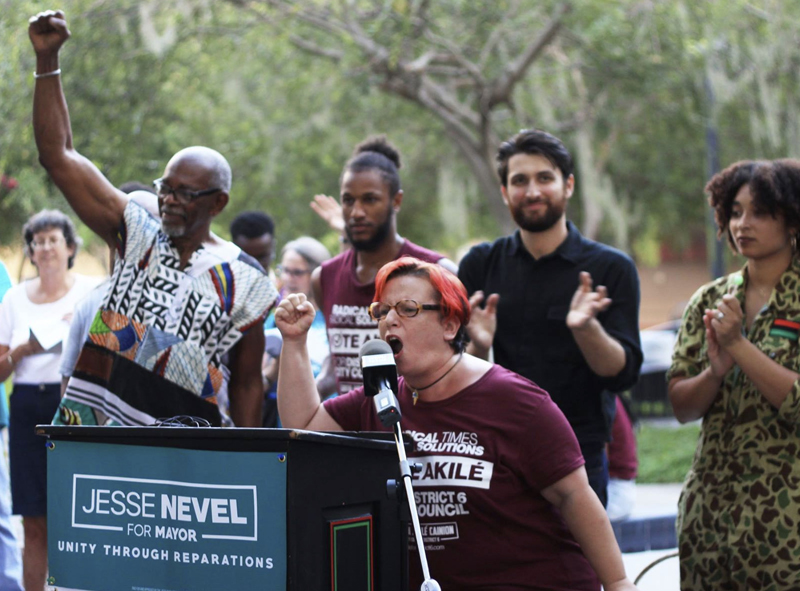
Rose Roby (c), APSP Chairman Omali Yeshitela (l), Jesse Nevel and Akilé Anai (r).
“The Pinellas local of the Green Party is proud to endorse Robin Harris as an unflinching fighter for justice,” said Rose Roby. “The Green Party stands with her in demanding reparations for the Black community. That means we support our Black communities fighting to take back what is theirs. All across the state, we are facing this racist drive to gentrify our Black communities out of existence. Police violence is one tool they use, as it goes hand-in-hand with gutting our social services, raising our rents, and creating virtual fortresses for the rich. Black community control of the police is therefore a cutting edge issue marking the difference between true independents and the failed and failing policies of the Democratic Party.”
— Jeff Roby
February 28, 2018

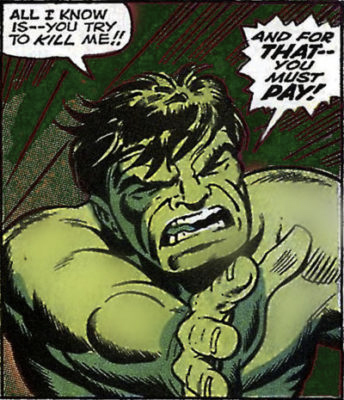
Jeff…Always great reading,,Always thoughtful and intelligent writing,,,And always another point of view not really heard anywhere else!
I hadn’t heard of this incident but what a fabulous idea: I fully support Black Community Control of the Police.